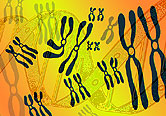
WEDNESDAY, May 5 (HealthDay News) — A family in which the father and all eight of his children have Tourette syndrome held clues to treating the neurological disorder that can cause debilitating, involuntary motor and verbal tics.
By studying the family’s genome, researchers identified a mutation on the HDC gene that encodes the enzyme L-histidine decarboxylase, which is involved in regulating levels of the neurotransmitter histamine in the central nervous system.
While the variant itself is likely very rare — meaning most people with Tourette syndrome don’t have the precise mutation — what’s known about the gene’s function in the body hints at new treatments, researchers explained.
Previous research in mice has shown that manipulating brain levels of histamine by decreasing activity of HDC makes mice more likely to have repetitive behaviors, such as biting, rearing and chewing. “Those are behaviors that on face value look like human tics,” said senior study author Dr. Matthew State, an associate professor of child psychiatry, psychiatry and genetics at Yale University School of Medicine.
Drugs that increase the release of histamine in the brain, but don’t affect histamine levels in other parts of the body, are in the latter stages of development. Previous research has also shown that when given to mice, the drugs decrease the repetitive behaviors.
It’s possible those drugs could also help people with Tourette syndrome, State said.
“In this case, genetics may point to the function of the gene, which points to what kind of mechanisms might be involved in the disorder,” State said. “The idea you could go from a rare genetic finding to a new approach to treatment is something that doesn’t happen very often.”
The study is published in the May 5 online edition of the New England Journal of Medicine.
Tourette syndrome tends to run in families. The disorder usually emerges in childhood and, for many, improves in adulthood. Although the causes of the syndrome are unknown, previous research suggests abnormalities in certain brain regions and in the neurotransmitters dopamine, serotonin and norepinephrine may play a role, according to the Tourette Syndrome Association.
Children who see doctors for Tourette syndrome often have other disorders as well, including depression, attention-deficit/hyperactivity disorder, obsessive-compulsive disorder or learning disabilities, State said.
Many cases of Tourette syndrome are mild and improve over time. But severe cases can be debilitating — socially and physically — and current treatment options are limited, said Dr. Francis J. McMahon, chief of Genetic Basis of Mood and Anxiety Disorders at the U.S. National Institute of Mental Health.
In addition to behavioral intervention, first-line medications include antidepressants and anti-anxiety medication. More severe symptoms of the syndrome can be treated with antipsychotic medications such as risperidone (Risperdal) or neuroleptic medications, such as haloperidol (Haldol), but long-term side effects can be serious.
McMahon called the new study “exciting.”
“Here is a condition we have known for many decades to be strongly familial. There’s been a huge effort put into trying to find the genes that are involved, yet we have not really come up with genetic findings until now that really explain why it runs in families,” said McMahon, also scientific advisor for the Tourette Syndrome Association. “Even more importantly, the findings point us toward new treatments.”
McMahon added: “There are a lot of medications in the pipeline that target the histamine pathway. This study suggests that it might be worth looking very carefully at those new drugs as a potential treatment for Tourette.”
The precise mutation, McMahon said, doesn’t ever need to be found again.
“The mutation may be unique to this family, but what we would suspect is that functional differences in the HDC gene or in the histamine biochemical pathway would play a role in other families,” he said.
More information
The U.S. National Institute of Neurological Disorders and Stroke has more on Tourette syndrome.

